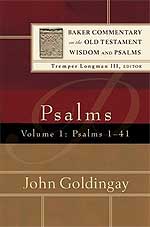I have been perusing a couple new commentaries on the book of Genesis and decided to update my commentary listing. I am aware of four recently published commentaries on Genesis:
- Bill T. Arnold. Genesis (New Cambridge Bible Commentary; Cambridge University Press, 2009). This is a popular series based on the NRSV aimed at pastors and laypeople, but useful for scholars and teachers as well. Buy from Amazon.ca | Amazon.com
- C. John Collins. Genesis 1-4. A Linguistic, Literary, and Theological Commentary (P&R Publishing, 2006). Buy from Amazon.ca | Amazon.com
- James McKeown, Genesis (The Two Horizons Old Testament Commentary; Eerdmans, 2008). Buy from Amazon.ca | Amazon.com
- John H. Sailhamer. Genesis (The Expositor’s Bible Commentary Revised Edition, vol. 1; Zondervan, 2008). Buy from Amazon.ca | Amazon.com
These four recent commentaries all have different things to offer the careful reader. Arnold‘s volume is an excellent study of the book of Genesis that engages its ancient context (in the commentary proper and in “Closer Look” sections) as well as its modern significance (primarily through “Bridging the Horizons” sections). This is the most academic of the four volumes, and also the most concise (he packs a lot of information in). McKeown‘s commentary is another excellent study of the book of Genesis which also tries to address both the “horizon” of the text and our modern “horizon” (that’s Gadamer speak for ancient and modern context). While Arnold embeds his discussion of theological relevance of a passage throughout the commentary, McKeown primarily offers his at the end of the commentary in an almost 200-page section on the theological message of Genesis and its theological significance for today. The next two offerings are more conservative in nature, although while Sailhammer is fairly conservative, that has never hampered his creative and detailed engagement with the biblical text (see his Genesis Unbound: A Proactive New Look at the Creation Account Buy from Amazon.ca or Amazon.com). And he doesn’t disapoint with his treatment of Genesis. Perhaps the biggest weakness in Sailhammer’s commentary is due to the limitations of a multi-volume series. Collins‘s conservative commentary on the first four chapters of Genesis is good, though I found it somewhat predictable (to be honest I was a bit disappointed).
If I had to recommend only one of these recent releases, it would be a toss up between Arnold and McKeown, and I would probably end up recommending Arnold.
Here is a listing of other forthcoming commentaries on the book of Genesis:
- David Baker. Apollos Old Testament Commentary (Apollos/InterVarsity Press). A semi-popular series based on the author’s own translation of the Hebrew text. This volume is several years down the road.
- Erhard Blum. Historical Commentary on the Old Testament (Peeters). The title of this series is a bit misleading if you are expecting a history of interpretation. The series is more of a historical-critical commentary aimed at scholars and ministers.
- Richard Clifford. Hermeneia (Fortress). This is one of the premier critical commentaries available in English (and it’s beautifully typeset). If Clifford’s volume on The Creation Accounts in the Ancient Near East and in the Bible (Catholic Biblical Association, 1994; Buy from Amazon.ca or Amazon.com) is any indication, this should be a very good critical commentary. It is a few years from publication.
- Blackwell Bible Commentaries (Blackwell). This series looks more at the reception history of the book under study. As such it is of primary interest to scholars and teachers. This one was assigned to Danna Fewell and Gary Phillips, but they have since dropped out and I don’t think the commentary has been reassigned yet (at least there is no indication on the Blackwell site)
- Duane Garrett. Kregel Expository Commentary on the Old Testament (Kregel; note the title of the series is still tentative). This is a conservative evangelical series geared for pastors and laypeople. Garrett is author of Rethinking Genesis, The Sources and Authorship of the First Book of the Pentateuch (Baker Book, 1991; Buy from Amazon.ca or Amazon.com), which I reviewed a number of years back. The commentary is at least two years from completion.
- Ronald S. Hendel. Anchor Bible (2 volumes, Doubleday). The new volumes in this series are excellent critical commentaries. The first volume on Genesis 1-11 was projected to be available in 2008 but it is behind schedule.
- Theodore Hiebert. Abingdon Old Testament Commentary (Abingdon). A popular series aimed at pastors and laypeople.
- Kathleen M. O’Connor. Smyth & Helwys Bible Commentary (Smyth & Helwys). This is a unique series aimed at pastors and laypeople that includes insightful sidebars, fine art visuals, and a CD-Rom containing all the text and images of the volume in a searchable format.
- Russell R. Reno. Brazos Theological Commentary on the Bible (Brazos/Baker). A series designed to serve the church; appropriate for pastors, teachers, and laypeople. This volume was projected to be released in late 2008, but is behind schedule.
If anyone knows of other recently published Genesis commentaries or others in preparation, please let me know.

 I’ve added a few new commentaries in the
I’ve added a few new commentaries in the